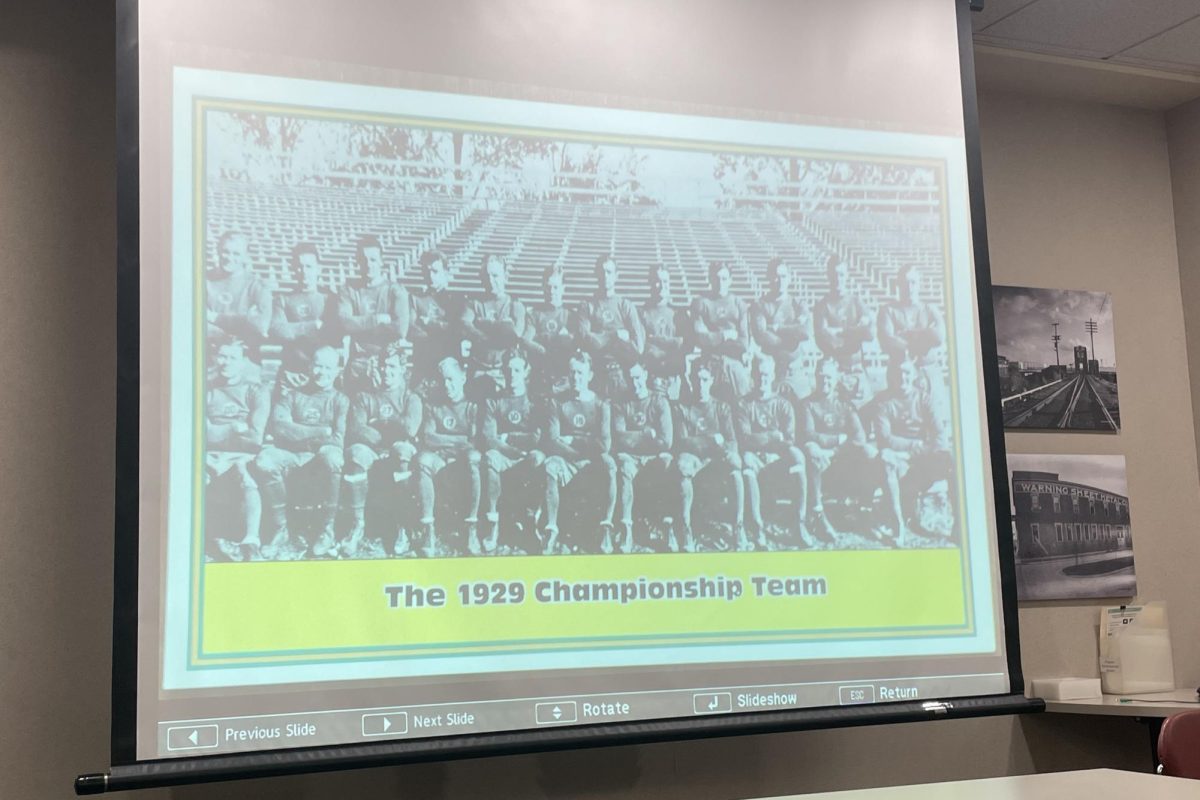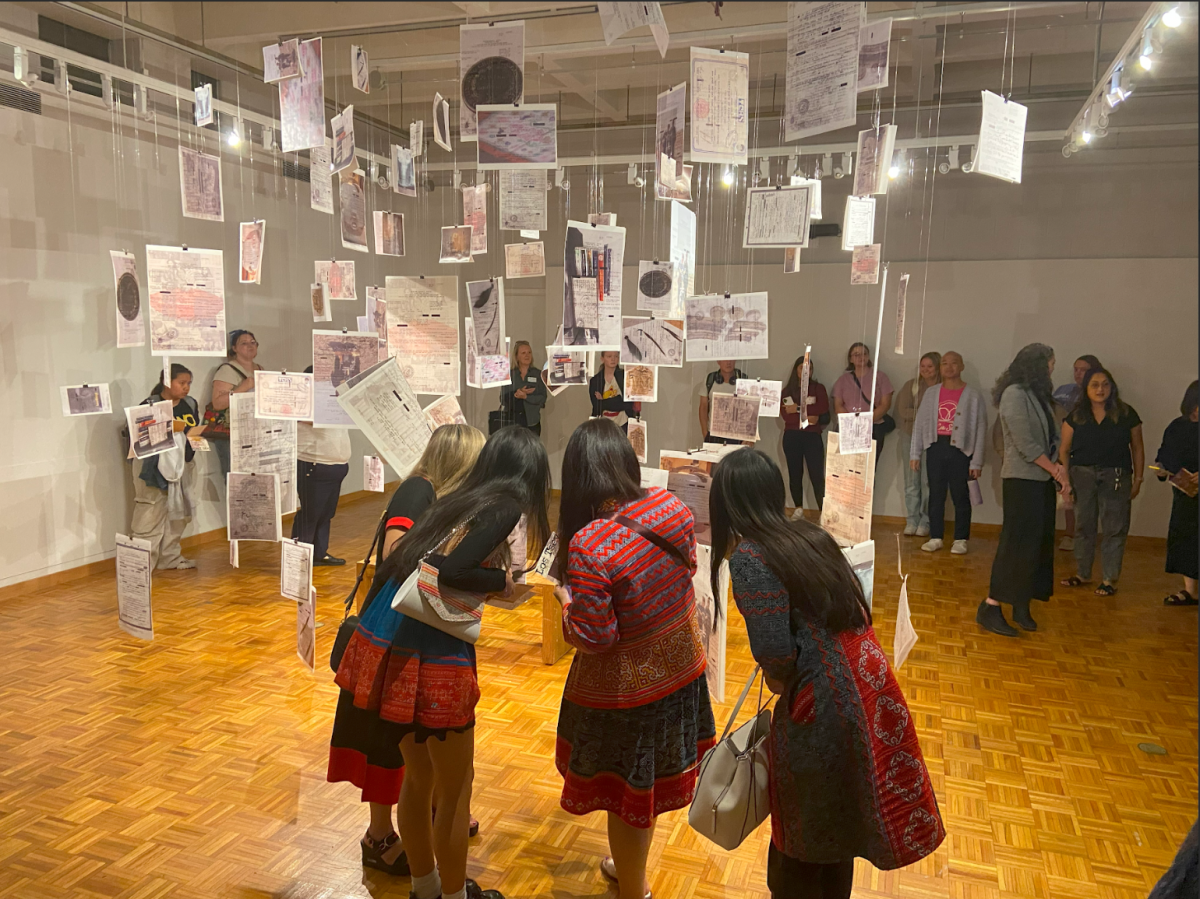Amidst the clamor of 40 students greeting each other, conversing and joking, one would barely notice 36-year-old Eric William Barnum enter the UW Oshkosh chamber choirs rehearsal. His presence is gentle and sturdy as he waits at the piano, scores placed in front of him, for the students to stop talking and be ready to sing. Without saying a word, voices fade, and the room goes quiet. Taking his glasses off for a moment, he massages his forehead and runs his hand through his I-just-got-out-of-bed, light, red hair. Then, in his calm voice, lacking the distinctive accent of his native Minnesota, Barnum tells the singers which song to take out. As he speaks, his enunciation is crisp, and the end of his phrases have a quickly descending intonation that his students often fondly imitate. Barnums conducting is not flashy or extravagant, with his arms swishing and sweeping in every direction. Instead, his movements are strong, direct and dependable. Throughout the entire rehearsal, Barnum pours all of his energy into conducting each piece. When the choir does well, he languidly gives a characteristic applause with one hand tapping the top of the other. These focused moments are sporadically broken by Barnums delivering a clever line, sending the entire choir into a roar of laughter. Barnum is not only the director of choral activities at UWO, but he is also a well-known choral composer. He would be the last person to tell someone that he has won numerous awards for his compositions and that Life Stories, a CD of his works, was a finalist for the American Prize in choral performance in 2014. Barnum, born in Crookston, Minnesota, always found that singing and playing piano came easier to him than to other kids when he was in high school, but he did not want to do music for a career. I wanted to be an archeologist, Barnum said. I needed to leave Minnesota if I wanted to be an archeologist, but I didnt have the guts to do it. Barnum went to Bemidji State University for its unique architectural model-building program, but switched to music after joining choir and going on a European tour with the choir. It was my conductors last year, Barnum said. He had been there for like, 40 years, something crazy. I saw the way he was, the way he interacted, the music that we learned, him crying in Europe at his last concert, all of us crying, going This is crazy. This is better. Theres something different about this than normal. He continued with music despite it being a career that wouldnt pay a lot of money, but he said that is not what life is about. But whats the risk? Barnum said. The risk is not being selfish. The risk is not living the quote American dreamthats a big lie. I think people who do music are people who understand that music offers something that is infinitely more rich than riches. When he reached his doctorate program at the University of Washington in Seattle, he said he desperately wanted to quit. I was looking down the gun barrel of having to listen to music the rest of my life and having that be my job, Barnum said. Tired of music, Barnum didnt want to listen to it or participate in it. I continued because when you spend 10, 11, 12 years doing anything, and you trip at the finish line, you look back and you say, How much money have I wasted? Why dont I just finish? In 2011, Barnum was searching for jobs as a choir director and found an open position at UWO. Despite his success, Barnum said he does not need approval from other people or recognition through awards and accolades. He never boasts about himself, often noting that he is as human as everyone else. What Im learning is that accolades really dont matter, and one of the ways Ive learned that is the more famous you get or the more accolades you get, the more you look at somebody who has equal and go, Thats a regular person. Thats in some ways a completely ridiculous person, Barnum said. Theyre normal human beings. Barnum is admired not only in the national choral community, but also within the UWO music department. UWO Chamber Choir member Joshua Schmidt said he and many of his colleagues are inspired by Barnums conducting and the way he powerfully, yet gently, handles the music. He is able to embody the music and lead the choir in a way unlike I have ever seen, Schmidt said. I hope that one day I have the ability to command the rules of music and ride the wave of musicality like he does. Today he continues to compose, but mostly for commissions. He said inspiration for his compositions comes and goes, and over time he relies less on inspiration and more on the craft of writing music. For what I get asked to do, its sometimes very difficult to be inspired, Barnum said. On the other hand, inspiration, life is sometimes too busy for it. Even though Barnum has honed his craft for years, he said sometimes when he writes music, he feels like he is guessing and doesnt know what to tell people when they ask how. Barnum said ultimately his music comes from God, but he also draws inspiration and energy from experiencing beauty, being in nature and getting away from technology. This is about truth, Barnum said. There is a deep truth in nature; nature isnt distracted. Nature isnt Facebook, technology, pluralism, nonsense, celebrityism. Longing to get away from distraction, Barnum said he wishes he didnt feel pressured to produce work and could take time to be quiet and reflect. Barnums philosophies are communicated through his works such as After Music. Schmidt said After Music is his favorite of Barnums compositions because it reconnected him to feelings of tranquility and carefreeness, ones seldom felt in college. The reason it resonated so well in my spirit was that it simply reminded me that we lost a child-like wonder, Schmidt said. The world took it away from us, and this piece brought back the memory of simplicity. Phillip A. Swan, co-director of choral studies at Lawrence University and friend of Barnum, said they became fast friends because of similar philosophies on faith, life and music. Eric is a caring, thoughtful individual, Swan said. He seems quite calm and laid back on the exterior, but is constantly digging deep, analyzing and processing situations around him at all times. Swan said one of the reasons that Barnums compositions stand out from other modern composers is his use of text. [Barnums compositions] are all well-crafted for the singer, Swan said. Barnum understands the voice and carefully writes lines that are lyrics and singer-friendly. He is also careful to choose texts reflecting great depth and emotion. Dylan Chmura-Moore, director of orchestral activities at UWO, said he remembers a particular concert where one of Barnums pieces was being performed, where he was moved to tears. I felt Erics music to be so human, visceral, sentimentalin the best sense of the wordreal and tangible and true that I could only respond in tears, Chmura-Moore said. The music was so full of beauty. Barnum also faces challenges in directing UWOs three choirs, but he said the best part of his job is the freedom he has to do the kind of music he wants. He said he likes to perform Scandinavian compositions because they are under-preformed. Moreover, he is drawn to the Scandinavian folk songs because he is of Swedish descent. One of the first times I did Scandinavian music, something sparked inside me that made me say, I recognize this, Barnum said. In my spirit I had a connection that was different than, say, Brahms. Barnum said the hardest part of his job is trying to get students to care. Through being in his choirs, he hopes students develop into professional singers in both skill and conduct. Every single rehearsal is a constant, day after day of reminding them why they need to care, Barnum said. Its literally constant, and it drives me batty. In the back of my mind, Im like, What do I have to do? And then we make progress and then the next day, instantly nothing. Nothing. Were back to square one. Schmidt said he thinks Barnums expectations for Chamber Choir are fair and within the singers abilities. Sometimes when the expectations are not met, some expect him to be mad or reprimand the choir, but that is not within Erics teaching style, Schmidt said. Eric has a zen-like way of acting. He doesnt want to disrupt the good aura of the choir. He just believes that things will work themselves out. A refuge for Barnum is his Christian faith, which he focuses on daily. He said it is the most important part of his life because true Christianity requires that it be his top priority. If theres anything worth thinking about in all of life, its this for me, Barnum said. This trumps music for me so far. Its so far up the mountain top from music. Music is to me just a door to experience the spiritual. Barnum said he hopes his faith is evident to his students by how he tries to be selfless and admit his mistakes. He also shows his faith through the way he treats people who have maybe done something wrong or inconsiderate, giving them the benefit of the doubt. Swan said Barnum is exceedingly genuine and transparent. What you see is what you get, Swan said. Hes honest, sincere, kind, compassionate and real. An opposite refreshing personality in a society that tends to value pristine facades and temporary quick fixes. Not only a man of depth, Barnum is a man of creative breadth as a writer, a poet, a photographer and a coffee brewer. He also wishes to travel around the world. To be perfectly honest, if I could do anything, I would travel, Barnum said. If I could be Rick Steves, I would do that. For now, Barnum will continue to work on directing and expanding the choirs at UWO and, more importantly for him, honoring God. If Im to believe in the providence of God, which I do, then Im supposed to be here right now, Barnum said.
Categories:
Faith motivates choir directors work, music, life
May 6, 2015
0








